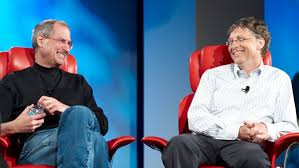Jobs stared at the floor. Later he told me that he was blown away by how honest and gracious Gates had just been.
喬布斯盯著地板。他后來對我說,蓋茨的誠實和風度讓他震動。
Jobs was equally honest, though not quite as gracious, when his turn came.
輪到喬布斯回答時,他也一樣誠實,盡管并非像蓋茨那樣有風度。
He described the great divide between the Apple theology of building end-to-end integrated products and Microsoft's openness to licensing its software to competing hardware makers.
他描述了蘋果和微軟的理念鴻溝,蘋果欲打造端到端一體化的產品,微軟則將自己的軟件開放授權給彼此競爭的硬件廠商。
In the music market, the integrated approach, as manifested in his iTunes-iPod package, was proving to be the better, he noted,
他指出,在音樂市場,集成的做法更好,這個已經有iTunes/iPod組合可以證明,
but Microsoft's decoupled approach was faring better in the personal computer market.
但是在個人電腦市場,微軟的分離政策發展得更好。

One question he raised in an offhand way was: Which approach might work better for mobile phones?
這番話隨即引出了一個潛在的問題:在手機市場,哪種方法會更好?
Then he went on to make an insightful point:
接著,他提出了一個精辟的觀點。
This difference in design philosophy, he said, led him and Apple to be less good at collaborating with other companies.
在設計理念上的差異導致他及蘋果公司更不善于同其他公司合作。
"Because Woz and I started the company based on doing the whole banana, we weren't so good at partnering with people," he said.
“因為沃茲和我創辦公司的時候,所有東西都是D己在做,因此我們不是很善于與人合作,”他說道。
"And I think if Apple could have had a little more of that in its DNA, it would have served it extremely well."
“我認為,如果蘋果天生能夠多一點點合作精神,會非常好。”


